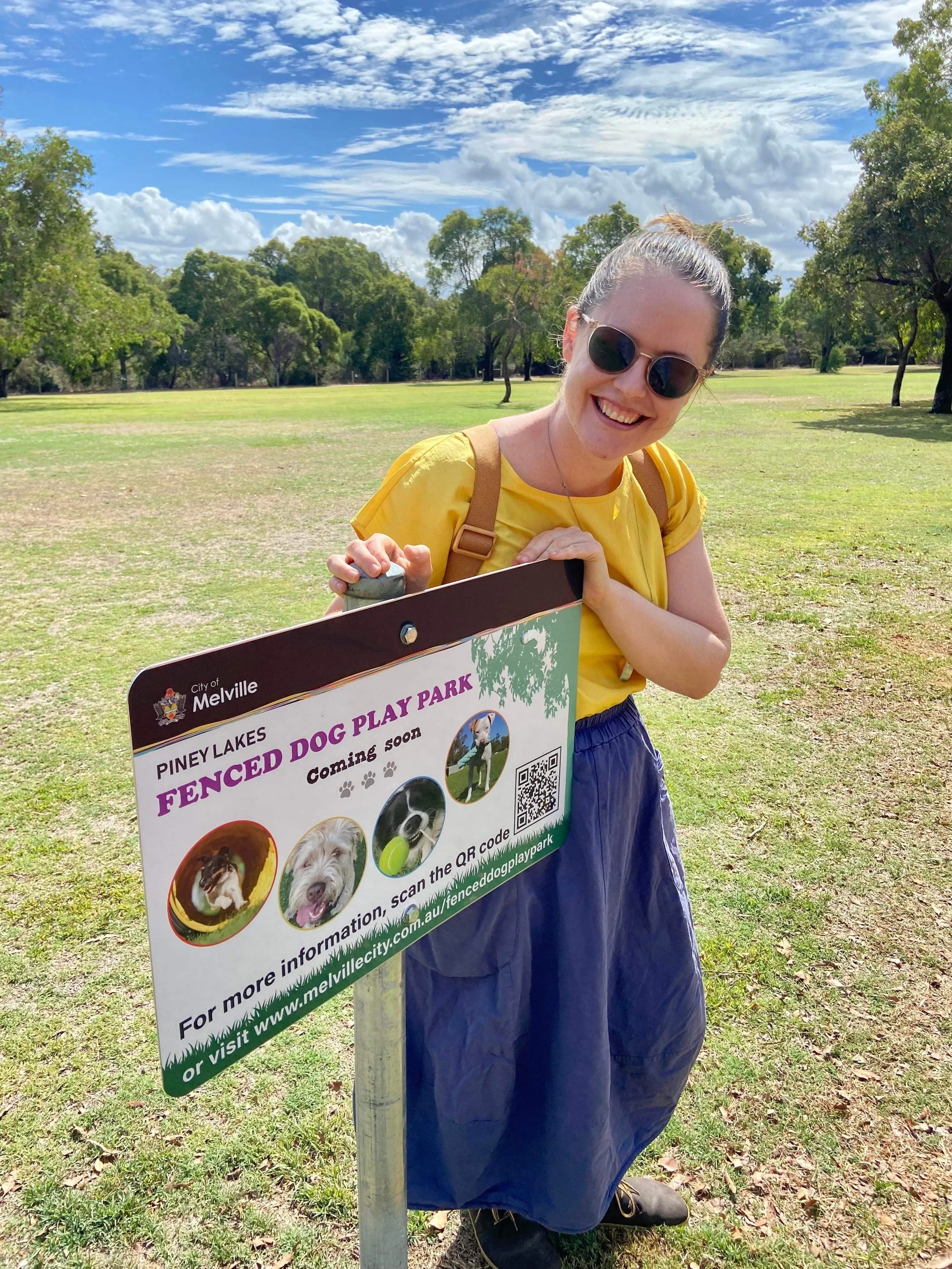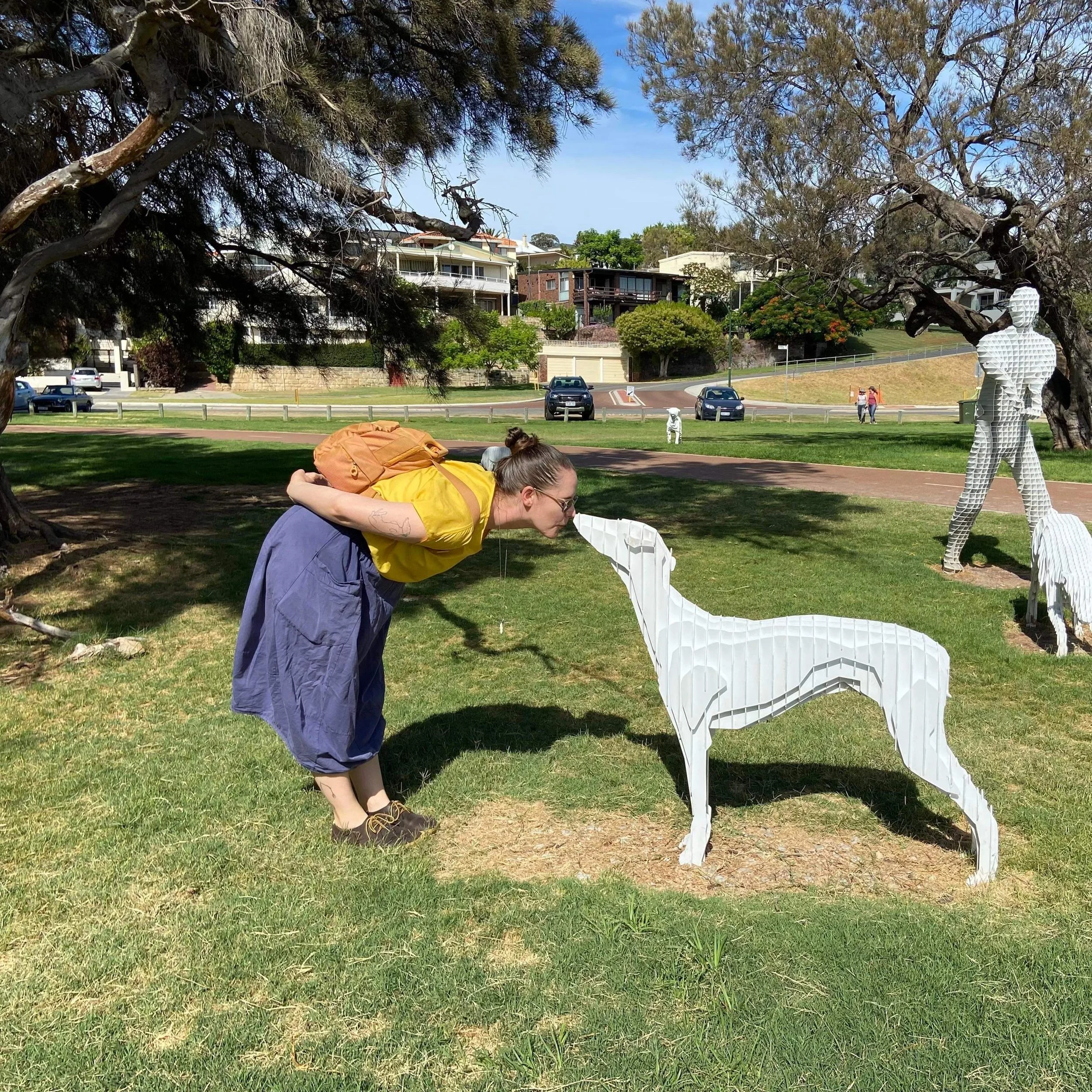Know Thy Neighbour #3 Residency: Amy Perejuan-Capone in the City of Melville #1
Amy Perejuan-Capone is currently working with the community of Melville. This residency forms part of one of Spaced’s current programs, Know Thy Neighbour #3.
Amy Perejuan-Capone works between Fremantle, the Perth hills, and international residencies. With a background in art and design, Perejuan-Capone’s practice is underpinned by an enquiry into the systems of exchange that are present through the acquisition and application of craft.
Here, Amy shares an update and reflects on her intentions for the residency.
My dogs name is Shelly, she’s a whippet and she’s just turned 2. My husband and I love her very much and she’s very spoilt. She is the glue and the distraction that keeps my household together and laughing. I don’t have children, though I’m a keen Aunty, so it’s Shelly that trots around being a piece of my heart outside of my body. She also takes my mind out of myself, derailing negative thought patterns and anxiety which I’ve lived with most of my life. The bad spirals find it harder to take hold simply because she’s around, being a silly noodle, needing to be fed, or taking for exercise and toilet.
Shelly and I have our regular haunts where I chat to people while the dogs scrap around. Sometimes this may be some folks only face to face convo for the day, especially during the pandemic. It’s really cool to hear about other peoples lives and work. I’ve met a lot of stay at home parents, an anaesthetist, other artists, a prosecutor, a retired lawyer with whom I chat philosophy, plenty of young people growing up with their dog. Even a young Navy dental nurse who is currently road tripping the US with her 2 cats and whippet.
As an artist I’m always ‘on’, so the passive dog chats are the best for unwinding and stepping out of my sometimes closed social/industry circle. Therapy for me, and time to be a dog for Shelly. Switching back to artist mode, I see these these vague interactions as an intangible cultural asset, and these spaces as more-than-human social sculpture. There’s unspoken rules, each park has a slightly different vibe and culture, regulars come and go, and the dogs have their own system of politics.
For my Know Thy Neighbour journey I have been paired with the City of Melville, and its a massive treat. Melville is a sprawling LGA with quite a bit of money, which shows, and the provision of public amenities for dogs and their families is really excellent. I take this to mean that great value is placed on dogs in the community, both in their own right and for the myriad benefits they bring to humans. Dogs are good social medicine which Melville seems well invested in.
Early in the project I did a road trip with Yvonne Doherty, City of Melville arts and culture officer, touring around the dog-friendly spaces. I can’t wait to engage with the community while my dog Shelly hangs out here, me chatting with humans (or not). I’m not very experienced in community engagement as part of project development in my practice, despite publicly interactive outcomes, and I’m quite shy. I hate accidentally stepping on toes or eliciting negative vibes. But when I do finally get into the community I have a great time, obviously! Anxiety sucks. So while these public spaces are not my local spaces, Shelly is kindly prepared to be my diplomat/social representative/icebreaker while I gain confidence.
I see a local government area map of dog-friendly public spaces as so much more than a map. I see it as network of chance encounters, open ended play and sharing, healthful activity, connection to place, and a statement of values. For me it speaks to access. My dog helps me navigate the world. Will she be happy? Can I keep her safe and healthy? Can we walk from where I live? Will having a car determine if I can get a dog? I can’t afford a place with a yard, I’m unable to drive. I’m lonely. I’m unfit. I’m uncool. I’m grumpy a lot of the time. Would a dog be a good mate to have?
Dogs have always offered us everything but words. Now we live at an interesting and exciting juncture where the ‘significant otherness’* of companion species like dogs is being meaningfully considered at public policy level. I’m approaching this project considering dogs as key nodes and vectors within the community network. To paraphrase the curatorial brief of Know Thy Neighbour, ’the network is the project’, and I look forward to see where and to whom my whippet leads me.
*see Donna Haraway’s The Companion Species Manifesto: Dogs, People, and Significant Otherness, 2006.






